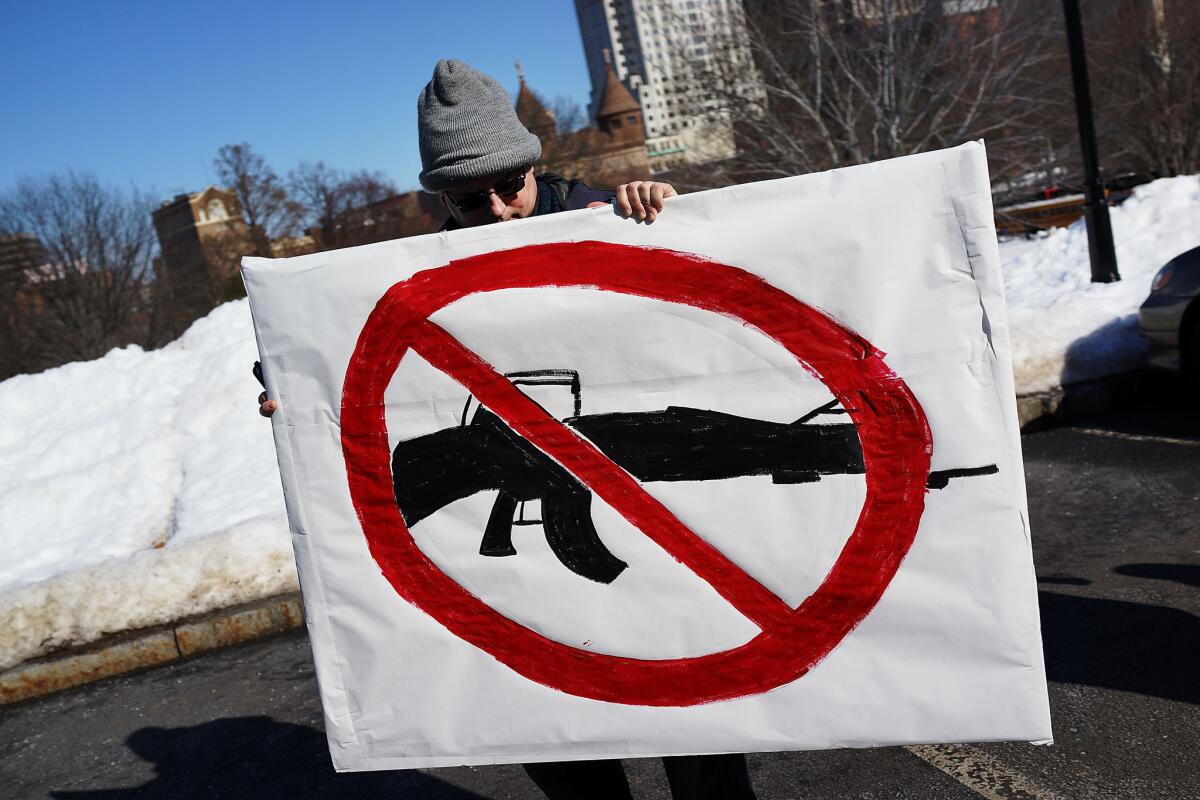McManus: Do-nothing Congress does something

- Share via
OK, so Congress hasn’t managed to pass a budget, fix the tax code or avert the automatic spending cuts of the dreaded “sequester.”
Are they getting anything done on Capitol Hill? Yes, and you’ll probably be surprised to hear where progress is being made: gun control.
In both the Senate and the House, bipartisan teams of legislators have taken meaningful steps toward passing new laws in the wake of the December massacre in Newtown, Conn.
SLIDESHOW: The 10 trigger-happiest states in America
The measures inching ahead aren’t the high-profile proposals that have attracted the most attention. There’s little hope that the current Congress will pass a ban on all assault weapons, and not much more that it will pass a ban on ammunition magazines with more than 30 rounds.
But there is a good chance that Congress will do two things: strengthen the system of background checks on gun buyers and toughen the penalties for illegal gun trafficking. In practical terms, those measures are probably more important than an assault-weapons ban, which wouldn’t affect the millions of military-style guns already in circulation.
First, background checks. Under current law, anyone who buys a gun from a licensed dealer must undergo an instant background check. But if you buy a gun in a private transaction, even from a seller who advertises on the Internet, there’s no background check in most states. (California is an exception.) Needless to say, studies have found that criminals buy most of their guns “on the street,” not from licensed gun dealers who require those pesky forms. The strengthened law would make such checks almost universal.
Will hardened criminals follow the law? Probably not, but that doesn’t mean it would be ineffective. In the 14 years that federal background checks have been in force, they have blocked almost a million sales of guns to criminals, to people under restraining orders for domestic violence and to the mentally ill. And they have created sales records that were often useful to police when guns later fell into the wrong hands.
The group of senators working on expanding background checks includes both a leading conservative, Tom Coburn (R-Okla.), and a leading liberal, Charles E. Schumer (D-N.Y.).
There are still kinks to work out, including whether a permanent record would be kept of private sales (Schumer wants it; Coburn doesn’t). But the issue almost certainly will make it out of committee and onto the Senate floor — and then to the House. And even a weak version of universal background checks — one with voluntary record-keeping, for example — would be a step ahead of where we are now.
That’s especially true if the background-check requirement is paired with the other, even more obscure proposal on the table: a new federal law on gun trafficking.
Current law makes it illegal to sell firearms to someone the dealer knows is a criminal or someone he knows intends to use the gun in a crime, but that’s a difficult charge to prove.
“It’s not illegal for a ‘straw buyer’ to say, ‘I bought this gun on Monday but I changed my mind on Tuesday and sold it to some guy for a $2,000 profit,’” noted Paul Helmke, former president of the Brady Campaign to Prevent Gun Violence.
And because the penalties in the law are relatively low, law enforcement agencies don’t devote much time to chasing suspected gun traffickers.
Bipartisan bills in both the Senate and the House would make it easier to prosecute straw buyers who sell guns to criminals, and would double the penalties for each offense. The sponsors say their hope is that tougher penalties will make it more worthwhile for police officers and prosecutors to go after gun traffickers.
As recently as 1999, even the National Rifle Assn. supported universal background checks. But this time out, the NRA says it will oppose the legislation, as well as any bill expanding background checks.
So why does it still seem likely the measures could pass? For one thing, Democratic strategists have made it clear they intend to use opposition to gun control measures against Republican candidates in suburban districts in the 2014 congressional elections — just as Republicans have used support for gun control against Democrats in rural areas.
“I believe the price to be paid politically will be to those who refuse to act,” Vice President Joe Biden said last month. “America has changed on this issue.”
The main reason passage seems possible is that Newtown hasn’t been forgotten. Gun control laws in America have come in reaction to violence. The 1929 St. Valentine’s Day Massacre pushed Congress to ban machine guns. The shootings of Robert F. Kennedy and the Rev. Martin Luther King Jr. — just two months apart in 1968 — prompted a law making it illegal for most felons and mentally ill people to own firearms. Federal background checks grew out of the 1981 assassination attempt on Ronald Reagan.
If Congress acts on background checks and gun trafficking but fails to pass a ban on assault weapons or ammunition clips, liberals will be disappointed. But President Obama will declare it a victory — and he’ll be right.
Follow Doyle McManus on Twitter @DoyleMcManus
More to Read
A cure for the common opinion
Get thought-provoking perspectives with our weekly newsletter.
You may occasionally receive promotional content from the Los Angeles Times.











